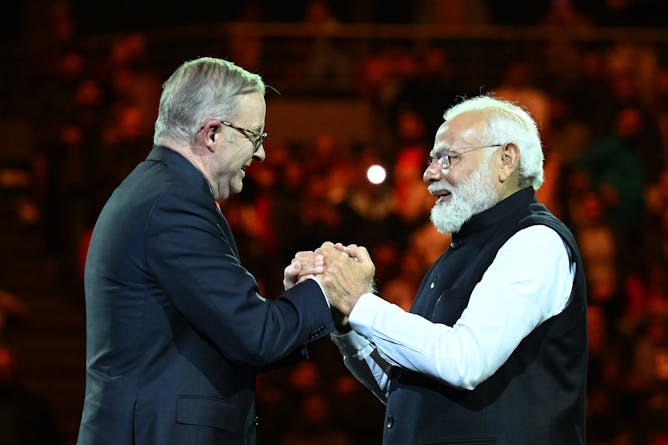|
Australia, like many other countries, has committed to achieving net zero emissions by 2050 – just 27 years from now. The Albanese government has also committed to sourcing 82% of all electricity from renewables by 2030 – just seven years from now.
Meeting these targets, and avoiding the potentially catastrophic effects of unchecked global warming, requires Australia to play its part in a transformation that former Chief Scientist Alan Finkel describes as “the most profound economic change to civilisation of all time”.
Getting to Zero, our new series starting today, examines how – and whether – this transformation will occur.
Drawing on some of Australia’s leading experts on climate change, the series shows how the net zero transition will challenge not only local and global politics but our economy, financial systems and planning schemes. It will test our collective resilience and our capacity to adapt to swift and sweeping change.
The transition may also provide great opportunities for Australia, as Anna Skarbek shows in her opening piece today. The chief executive of Climateworks Centre works closely with government and industry to develop net zero plans, and amid the constant conflict over climate policy she observes tectonic shifts underway in our economy and regions. In an accompanying article, political scientist Judith Brett gives the other side of the climate dilemma: a much bleaker assessment of the ability of our political system to solve this problem in time. The series continues on
Wednesday, when Finkel will argue that the Biden administration’s climate legislation could be a game-changer for the net zero transition in Australia and around the world.
Getting to Zero will tackle tough questions about the transition. How will our electricity grids be remade? Should Australia allow new coal and gas projects? Is nuclear power part of the solution? Why are many regional areas opposing new renewables and transmission infrastructure, and how can their concerns be addressed? Are untried and potentially dangerous technological solutions our last hope to save the planet?
The transition to net zero will stand or fall on the support it wins from the Australian public. We are confident Getting to Zero will leave our readers much better informed about this great challenge of our time, and the role we can all play in responding to it.
|

|
James Button
Commissioning Editor
|
|

Anna Skarbek, Climateworks Centre
The widespread pessimism about our ability to solve climate change is misplaced. Australia is putting in place the fundamentals of a net zero future. Now we need to go faster.
|

Judith Brett, La Trobe University
The rising climate crisis presents an existential threat to humanity yet our government and political system are on a go-slow response. Is this issue too hard for humans to solve?
|

Paul Strangio, Monash University
If the referendum is lost of October 14, the prime minister will have to quickly pivot to the role of healer-in-chief.
|

Amitabh Mattoo, The University of Melbourne
Today there are few countries in the Indo-Pacific which share so much in common, in both values and interests, than India and Australia. Andrew Charlton’s new book examines the possibilities.
|

Tara Crandon, QIMR Berghofer Medical Research Institute
We’ve had an early start to the bushfire season and there’s more to come. No wonder spring isn’t always a celebration.
|

Alan Pears, RMIT University; Nicola Willand, RMIT University; Sara Vihaji, RMIT University; Trivess Moore, RMIT University
People who switch from gas to reverse-cycle air conditioning to heat their homes still want to feel comfortable. Some don’t. Home electrification programs must tackle the causes of the problem.
|

Penny Van Bergen, University of Wollongong
According to cognitive psychology there are three distinct types of memory. Each plays a different role in effective study.
|

John Hawkins, University of Canberra
This is why no one is buying your cartoon ape.
|

Erin Harrington, University of Canterbury; Jessica Ford, University of Adelaide; Michelle Arrow, Macquarie University; Stuart Richards, University of South Australia; Yvette Grant, The University of Melbourne
The weather might be turning, and the sun might be shining – but these picks will have you wanting to spend some more time on the couch.
|
Politics + Society
|
-
Michelle Grattan, University of Canberra
In this podcast, Treasurer Jim Chalmers canvasses inflation, migration, the cost of living pressures on households and concerns about China’s economy
-
Alexander Gillespie, University of Waikato
From the war in Ukraine and China’s role in the Pacific, to multi-billion-dollar military decisions, New Zealand will face huge challenges during the next term of government.
|
|
Health + Medicine
|
-
Di Winkler, La Trobe University
The disability royal commission’s final report makes 222 recommendations, including ensuring people with disability are considered in national housing and homelessness plans.
|
|
Environment + Energy
|
-
Aaron Simmons, University of New England; Annette Cowie, University of New England; Beverley Henry, Queensland University of Technology; Brian Wilson, University of New England; David Pannell, The University of Western Australia; David Rowlings, Queensland University of Technology; Elaine Mitchell, Queensland University of Technology; Matthew Tom Harrison, University of Tasmania; Peter Grace, Queensland University of Technology; Raphael Viscarra Rossel, Curtin University; Richard Eckard, The University of Melbourne; Warwick Badgery, The University of Melbourne
A group of agricultural and soil scientists has serious concerns about the way credits are awarded for soil carbon sequestration in Australia.
|
|
Books + Ideas
|
-
Dilan Thampapillai, University of Wollongong
Authors are furious about finding their works on pirated dataset Books3. Copyright is the usual avenue for redress, but while AI moves at speed, the law is slow – and not designed to combat AI issues.
|
|
| |
|
|
|
NIDA
Kensington NSW, Australia
•
Full Time
|

|
|
|
|
| |
| |

|
| |
| |
| |
Featured Events, Courses & Podcasts
|
View all
|
|
1 January 2023 - 7 October 2026
•
|

|
6 July - 6 October 2023
•
|

|
19 - 20 October 2023
•
South Bank
|

|
|
|

|
|
|
|
| |
| |
| |
| |
| |
|
|